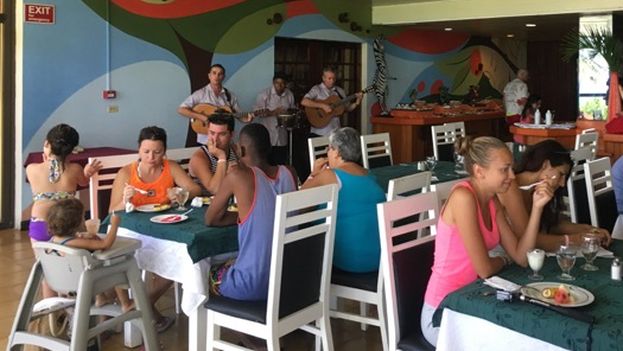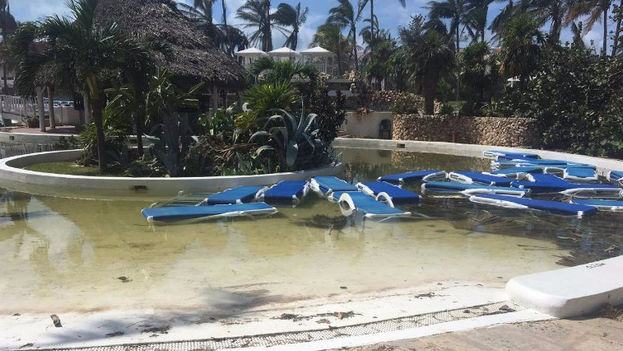
14ymedio, Luz Escobar and Zunilda Mata, Havana/Varadero, 21 September 2017 — “This is what’s left of the gardens of the Blue Lagoon,” says an employee while looking at a cellphone photo of fallen palm trees and tangled vegetation. The bus in which he is traveling is responsible for distributing staff to the hotels in Varadero, Cuba’s main resort, which is trying to recover after Hurricane Irma.
The Hicacos peninsula, where the famous beach is located, is wrapped up in a recovery effort operating at different speeds. A land of contrasts, alternating luxurious resorts, mansions and fragile private houses with gabled roofs, the main tourist center of the Island is binding up its wounds on the eve of the high season.
On Tuesday, the streets were clear of the logs and debris left by the storm, but inside the hotels the damages range from light to serious. However, Varadero again has that air of a “tourist nation” – one with no flag or local flavor – that can be found anywhere on the planet where there is sun and sand.
“This beach feeds a lot of people,” Rigoberto told 14ymedio; he is an artisan by profession licensed to sell seed and pearl necklaces in the town’s most important artisan fair. “On the days we couldn’t sell, people were crazy because they lost a lot of money,” he says.
On a small table Rigoberto sets out ceramic ashtrays, carved wooden images of sensual women, and tiny clay turtles. “The worst has been for the homeowners who have suffered damages but who don’t have the resources available to the hotel managers and the state,” he says.
After days of anguish, an urgency to close the wounds has overtaken the residents and the resort employees. “We’ll all be ruined if the tourists decide to go to Cancun,” Rigoberto explains. The Mexican beach is Cuba’s main rival at a time when the Greater and Lesser Antilles have been battered by several hurricanes.
Three young men speaking Russian pass near Rigoberto wearing wrist-bands confirming their “all-inclusive” status at the resort. “Those are the first who have returned,” says the artisan. “They don’t care that much that the hotels aren’t a hundred percent ready, because what they are looking for is sun,” he opines.
Irma hit Cuba just before the high season, in a year when the authorities expected to reach the longed-for figure of five million tourists. When the powerful hurricane hit land, there were about 50,000 travelers in the entire island according to the calculations of the Ministry of Tourism.
After the weather disaster the official information has talked of devastation to describe the situation in the keys area. But at the same time a recovery in record time seems destined to appease the fears of travelers.
Wednesday’s primetime news warned of “an international campaign against Cuban tourism” that “is attempting to magnify the damages.” Tourism Minister, Manuel Marrero assured that “there is no hotel that has suffered structural problems.”
However, complaints about substandard services are being felt and reported at hotel reception desks and in internet travelers’ forums. At the Royalton Hotel Hicacos about 40 guests are trying to make their vacation holiday not end in nightmare, but the conditions are not the best.
Joseph and his wife did not want to cancel the reservation they made six months ago to visit Varadero and “get a rest from so much work,” they tell this newspaper. Coming from Germany, they followed the course of the hurricane, fearing that the agency would postpone the trip or send them to another part of Cuba.
“We were scared to arrive but outside of some broken glassware in the hotel we found no major damage to the infrastructure,” says the German, although he acknowledges that the food is not good because he came looking for local flavors and even the butter is imported.
“The employees are very nervous and the hot water service still isn’t working very well.” Among the problems most lamented by the guests is that “there is no peppermint for the mojitos” and “there are few fruits at breakfast despite being in the tropics.”
For Andrés, a Colombian who spent his honeymoon in Cuba during and after Irma’s passage, the most difficult thing to deal with was what he calls “the fall in quality.” Staying at the Varadero Meliá hotel he lamented that the menu was bad. “Although they say they have two buffet restaurants, it’s not true,” he complains, and notes that the water sports services are not yet working again.
“We had to pay for the extra nights we stayed at the hotel because our flight was canceled and they didn’t give us any rebates even though the pools aren’t open and they didn’t change the sheets for more than three days,” he protests. Now, he hopes to make a claim to demand a refund of some of the money he spent.
At the moment, the management of the hotel has sent him a message stating its “total willingness to favor you with the best conditions if you return to the Varadero Meliá.”
Some hotels in the area are still closed, such as the Meliá chain’s Varadero Paradisus, which suffered severe damages. An employee of the Cubatur agency explained via telephone to this newspaper that the area known as Family Concierge was “devastated” and there were also damages to the main building and to the restaurant that was built near the beach.

A spokesman for the Mallorcan chain, which owns a total of 27 hotels on the island, 11 of them in the keys, told the Spanish media that their accommodations in the famous resort have suffered minor damages and are re-establishing their services. In addition, he specified that the closure of the Varadero Paradisus is because of improvements being made before the high season arrives.
The head of the sales department of the Sol Palmeras hotel proudly said that on Wednesday about 200 tourists were staying at their facility. “Given how the area was left, we have recovered quickly,” he emphasized.
Dana, an employee of the exclusive Royalton Hicacos, acknowledges that conditions are still not optimal. The main damages are in “the buffet service restaurant and beach gazebo, still closed,” after Irma.
Despite this, private and government-controlled hotel authorities have not decreed any special reduction in room costs, according to a Cubanacan travel agency specialist.
Only during the hurricane itself “tourists who came here and booked directly at the hotel reception received a 40% discount,” says Dana. This rebate was offered only to clients who arrived at the accommodation relocated from the keys of the north of the Island, who were compensated for the fact that their new accommodation had no electricity.
To avoid distress, many are choosing another destination within the island where the hurricane did less damage. The largest beneficiaries are the town of Viñales, the María la Gorda beach, also in the west, and the city of Trinidad in the south.
“There is a lot of demand for the hotels in the historical center of Havana as well,” says an employee who offers tour packages in the Cubatur office in the Habana Libre Hotel. “What is totally closed is accommodation in the northern keys,” she explains to a Cuban client.
National tourism has been increasing since 2008, when Raúl Castro’s government allowed Cubans living on the island to go to the country’s hotels, from which they had been banned for decade. In 2014, about 1.2 million nationals stayed in these facilities and spent 147.3 million Cuban convertible pesos (roughly the same in US dollars), according to official data.
The trend has continued to increase and “most of the packages sold here are intended for Cubans,” says the Cubatur employee. She notes, however, that “right now international tourism is being prioritized, for those who made reservations weeks ago.”
Rebeca Monzó, who lives in Havana’s Nuevo Vedado neighborhood and rents a room through Airbnb, has not suffered serious damage to her business. So far she has not had reservation cancellations and is waiting for a new customer who is arriving this week.
During the hurricane she hosted two Spaniards “who fled from the province of Sancti Spíritus” when the first winds began to blow. Her guests “experienced the hurricane from another perspective,” says Monzó.
“They helped us to store water, lined up to buy bread and experienced their days in Havana as a great adventure.” The hostess acknowledges that they survived “thanks to the pasta we had because in those days there was nothing to eat.” Her home was five days without water and electricity.
Shortages are one of the most negative side effects left by the hurricane.
In Varadero, the extensive informal market network that nourishes a good part of the area’s private businesses is also trying to recover. “In this area it was very easy to buy shrimp and lobster,” says Rigoberto, while taking some canvases painted with coconut motifs and reddish sunsets out of boxes.
“The hurricane has been a serious blow to the seafood vendors because apart from cutting off several access roads and leaving a lot of people without refrigeration, there is now more police control in the area,” he says.
The sale of these raw products is forbidden to private individuals and is strictly punished by the authorities, as is the black market in cheese and milk, also prominent in the area.
At the corners of the main street, parallel to the beach, are uniformed police officers and some state brigades cleaning the area. “Until all this goes away we have to stay quiet,” recommends the artisan. “Irma has stirred everything up and it will take time until the waters find their level,” says a Spaniard.
